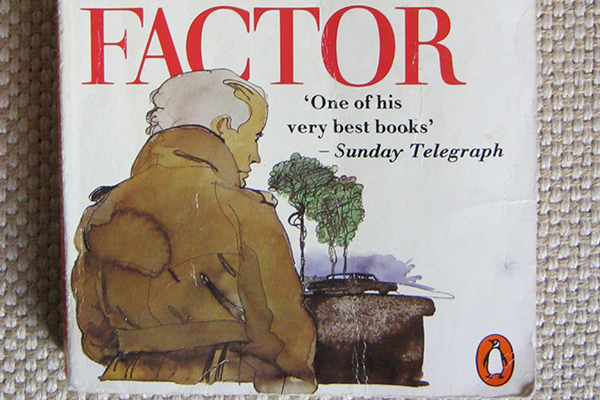Home »

Give Graham Greene a try
Book Review
By Derryll White
Greene, Graham (1978). The Human Factor
I never read Graham Greene. Throughout my youth I was into muscular writers – Hemingway, Norman Mailer, Leon Uris. Then I broke through into the craziness of William Burroughs, Jack Kerouac, Allen Ginsberg, Ken Kesey and Hunter S. Thompson.
 I was aware of Greene but he was set off somewhere in my mind as a gardening ponce, a learned cultural homosexual author of the ‘literate class.’ I read Le Carrre and Deighton and other spymasters, but always slid by Greene.
I was aware of Greene but he was set off somewhere in my mind as a gardening ponce, a learned cultural homosexual author of the ‘literate class.’ I read Le Carrre and Deighton and other spymasters, but always slid by Greene.
Well – he opens ‘The Human Factor’ with a stunning quote from Joseph Conrad (who, along with Melville, Poe and Steinbeck hooked me on reading as a lifetime pursuit):”I only know that he who forms a tie is lost. The germ of corruption has entered into his soul.”
I so completely believe in love, have always offered myself on the tormented altar of it, that I would have tossed this book aside right here had anyone other than Conrad penned it. But if Greene is willing to chase after this phantom of destruction then I, a hopeless romantic, must at least read what his argument is.
The place one is immediately pulled into, the class and consciousness of Britain in the 1970s, is foreign but delightfully so. Then Africa becomes an even more dreamlike player in the novel. Having been recently immersed for an extended period in the different sociological milieu and values of Sweden, I find myself perhaps more open than previously to the foreign world Greene provides. This is a world where people engage in activities based on social class and where questionable things are made understandable by one’s relatives and relation to others. Foreign, yes, but an intriguing challenge for the reader to understand and decipher. And perhaps my vocation of historian, my reading of WW I diaries and personal accounts of international power and trickery, has opened me to the detailed descriptions of place and purpose and subterfuge Greene lays out in this novel. Slow and painstaking, and absolutely strong and delightful writing – “daydreams had become realities.”
Greene is haunting here. I know of no other word for it. He pulls the reader through a past geo-politic long gone and into personal loves – long gone as well but, I suggest, absolutely current (and hopefully different) in the memory of each reader. He brings me to meld the past with the present, to consider love as THE force that will always inform my world. And Conrad is proved right. I am so corrupted by love as to offer my soul to it, irrevocably.
You may be getting the picture. I found ‘The Human Factor’ a delightful and challenging novel. I am so glad I had the opportunity to recover this literary artifact. I will read more Graham Greene even as I will continue to corrupt my soul with love, hopefully until I die. Please give this author a try.
Quotes from the novel
LOVE – A man in love walks through the world like an anarchist, carrying a time bomb.
FREEDOM – “You say: I am not free. But I have lifted my hand and let it fall.”
AFRICA – “Our worst enemies here are not the ignorant and the simple, however cruel, our worst enemies are the intelligent and the corrupt.”
DOGS – Castle didn’t like Buller – he had bought him for a purpose, to reassure Sarah, but Buller had proved inadequate as a watchdog, so now he was only one responsibility more, though with canine lack of judgment he loved Castle more than any other human being.
NOMENCLATURE – “Good night, Maurice.”
The use of his name was a sign of love – when they were together it was an invitation to love. Endearment – dear and darling – were everyday currency to be employed in company, but a name was strictly private, never to be betrayed to a stranger outside the tribe.
HAPPINESS – “Perhaps because I’m feeling happy. Don’t ask me why, Sarah. Happiness goes when you speak of it.”
DEATH – Everyone would be looked after for better or worse by somebody else. Somebody with the highest professional qualifications. That was the way death ought to come in the end, he thought, as he moved slowly and happily in the wake of the stranger. He always hoped that he would move towards death with the same sense that before long he would be released from anxiety forever.
REGRET – One can’t reason away regret – it’s a bit like falling in love, falling into regret.
AFRICA – “….realism never got anyone very far in the kind of Africa I used to know. My Africa was a sentimental Africa…. My Africa was still a little like the Africa of Rider Haggard.”
FANTASY – “out of reality are our tales of imagination fashioned.”
ETHNICITY – If Davis at first appearance looked as though he would be at home in a bookmaker’s compound, Daintry was unmistakably at home in the expensive enclosure on a grouse moor.
TRUTH – Castle could see that telling the truth this time had been an error of judgment, yet, except on really important occasions, he always preferred the truth. The truth can be double-checked.
LOVE – Love was a total risk. Literature had always so proclaimed it.
ENGLISH – “He’s a good runner. In England there’s no trouble if you are good at any sort of game.”
OLD AGE – They lay quietly together, all these years later, only a shoulder touching a shoulder. He wondered whether this was how the happiness of old age, which he had sometimes seen on a stranger’s face, might come about…
POLITICS – An American marriage, it seemed, could not be classified as a foreign marriage: to marry a foreigner special permission had to be obtained and it was often refused, but to marry an American was perhaps to confirm the special relationship.
GAMES – “The Russians don’t play bridge, or so I understand.”
“Is that important?”
“We are playing games, Daintry, games, all of us. It’s important not to take a game too seriously or we may lose it. We have to keep flexible, but it’s important, naturally, to play the same game.”
RESPONSIBILITY – “You just report. No bad conscience. No guilt.”
“An action has nothing to do with its consequences. Is that what you’re telling me?”
“The consequences are decided elsewhere, Daintry.”
BOOKSTORE – “How’s your business?”
“Quiet, sir, very quiet. Fashions change. I remember the 1940’s, how people would queue for a new World’s Classic. There’s little demand today for the great writers. The old grow old, and the young – well, they seem to stay young a long time, and their tastes differ from ours…”
 Derryll White once wrote books but now chooses to read and write about them. When not reading he writes history for the web at www.basininstitute.org.
Derryll White once wrote books but now chooses to read and write about them. When not reading he writes history for the web at www.basininstitute.org.







